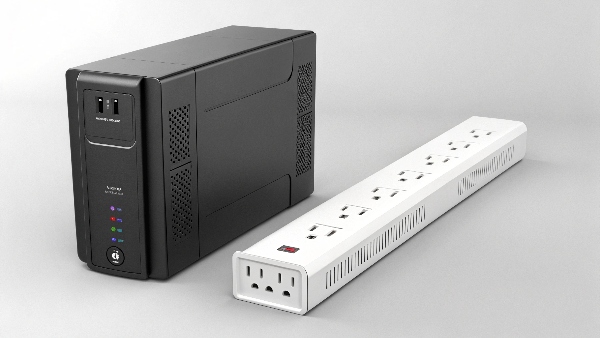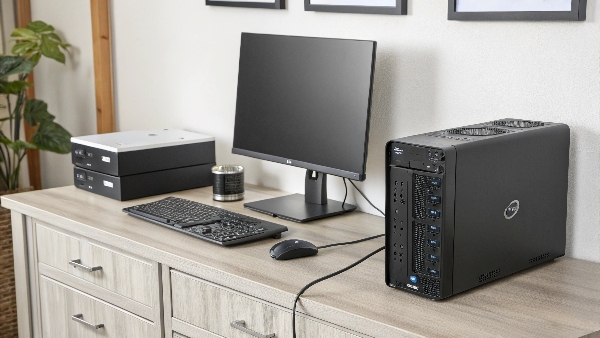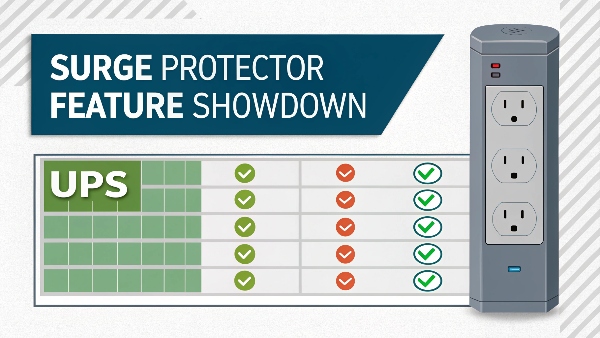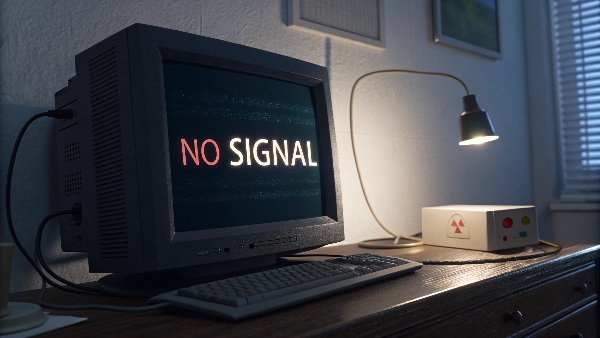Struggling to decide between a UPS and a surge protector for your electronics? Both offer protection, but one provides a much more comprehensive safety net against power problems.
A UPS (Uninterruptible Power Supply) is superior as it provides battery backup and surge protection. A surge protector only defends against power spikes, offering no protection against outages.

In my role at DAOPULSE, where we've specialized in OEM/ODM uninterruptible power supplies for a decade, this is one of the most common questions we encounter. Clients, whether they are procurement managers for large hospitals like Mr. Li or system integrators for data centers, need to make informed decisions about power protection. While both devices play a role in safeguarding electronics, their capabilities are vastly different. The core function of a UPS extends far beyond what a simple surge protector can offer, and understanding this difference is key to truly protecting your valuable equipment and data.
Should I use a surge protector or an UPS?
Torn between buying a cheaper surge protector or investing more in a UPS? The best choice depends on the value of your equipment and how critical uninterrupted operation is for you.
For critical electronics like computers, servers, and networking gear, a UPS is highly recommended. For less critical, non-data-sensitive devices, a surge protector might suffice.

This is a very practical question that many people face. The decision hinges on what level of protection your equipment needs and the potential consequences of a power interruption or damage.
Here's a breakdown to help you decide:
Use a Surge Protector if:
- You primarily want to protect against voltage spikes and surges (e.g., from lightning or power grid fluctuations).
- The connected device does not store or process critical data that could be lost during a sudden shutdown (e.g., lamps, fans, kitchen appliances with simple electronics, phone chargers).
- Brief power interruptions are not a major concern for the device's operation.
- Budget is a primary constraint, and you need basic protection for multiple low-value items.
Use a UPS (Uninterruptible Power Supply) if:
- You need protection against power outages (blackouts), sags (brownouts), and surges.
- The connected device is a computer, server, NAS, gaming console, modem/router, or any equipment where sudden data loss or corruption would be problematic.
- You need time to save your work and shut down equipment gracefully during a power outage.
- The equipment is sensitive and expensive, justifying a higher level of protection.
- Uninterrupted operation, even for a short period, is important (e.g., finishing a transaction, completing a download, maintaining security camera operation).
At DAOPULSE, we manufacture both lead-acid and lithium battery UPS solutions, and many of our patented technologies are focused on providing comprehensive power conditioning alongside battery backup. The simple truth is, a UPS offers significantly more protection than a surge protector alone. For any device that processes or stores important information, or where a sudden shutdown could cause operational issues or damage, a UPS is the clear choice. This is why the demand for our UPS systems is consistently high from clients who understand that the cost of data loss or hardware replacement far outweighs the investment in proper power protection.
Do I really need an UPS for my computer?
Wondering if your computer truly needs the extra protection of a UPS, or if a simple surge protector will do? Ignoring this could lead to lost data, corrupted files, or even hardware damage.
Yes, you really need a UPS for your computer. It protects against data loss from outages and safeguards sensitive components from both surges and sags, ensuring longevity and reliability.

Absolutely, yes. For any computer system – whether it's a desktop PC, a workstation, or even a server – a UPS is a highly recommended, if not essential, piece of equipment. While a surge protector offers a basic level of defense against voltage spikes, it's insufficient for the comprehensive needs of a computer.
Here’s why a UPS is crucial for your computer:
- Prevents Data Loss and Corruption: This is the most significant benefit. If the power cuts out suddenly, any unsaved work is instantly gone. Worse, the operating system or important files can become corrupted during an abrupt shutdown, potentially rendering your computer unusable or requiring lengthy repairs. A UPS gives you battery power to save everything and shut down properly.
- Protects Against Hardware Damage: Power surges can fry your motherboard, power supply unit (PSU), hard drive, or other sensitive components. While a surge protector helps, a UPS typically offers more robust surge protection. Moreover, a UPS also protects against sags and brownouts (low voltage), which can also stress and damage computer hardware over time. Some UPS models also provide voltage regulation, delivering cleaner, more stable power.
- Saves Time and Frustration: Recovering from data loss or a corrupted system can be incredibly time-consuming and frustrating. The cost of a UPS is often minimal compared to the value of your time and data.
- Extends Component Lifespan: By providing clean, stable power and preventing abrupt shutdowns, a UPS can help extend the lifespan of your computer's components.
- Maintains Productivity: Even a brief power flicker can force a computer to restart, interrupting your workflow. A UPS keeps you running through these minor events.
I remember an instance early in my career at DAOPULSE where a graphic design company we were supplying with standard surge protectors initially, experienced a series of local power flickers. They lost hours of unsaved design work multiple times. After we equipped them with our tailored UPS solutions, they reported a dramatic decrease in lost work and system instability. This is a common story and a key reason why the market for reliable UPS systems, like the ones we design and manufacture with our patented technologies, is constantly growing.
Is a surge protector better than a UPS for PC?
Debating if a surge protector alone offers adequate safety for your PC, or if a UPS is overkill? Choosing incorrectly could leave your computer vulnerable to common power issues.
No, a surge protector is not better than a UPS for a PC. A UPS offers superior protection by providing battery backup against outages and sags, in addition to surge protection.

This question gets to the heart of understanding the different levels of protection these devices offer. Unequivocally, a UPS (Uninterruptible Power Supply) provides far superior protection for a PC compared to a standalone surge protector.
Here's a direct comparison for PC protection:
| Feature/Protection Against | Surge Protector | UPS (Uninterruptible Power Supply) |
|---|---|---|
| Power Surges/Spikes | Yes | Yes (often more robust) |
| Power Outages (Blackouts) | No | Yes (provides battery backup) |
| Power Sags (Brownouts) | No | Yes (switches to battery or regulates) |
| Voltage Fluctuations | Limited/No | Yes (many models offer AVR) |
| Data Loss Prevention | No | Yes (allows safe shutdown) |
| Hardware Protection | Partial (from surges only) | Comprehensive |
| Uninterrupted Work | No | Yes (for the duration of battery life) |
While a surge protector is better than plugging your PC directly into the wall, it only addresses one type of power problem: excess voltage. It does nothing when the power disappears (blackout) or drops too low (brownout/sag). These are common occurrences that can lead to immediate data loss, file system corruption, and even hardware stress on your PC.
A UPS, on the other hand, covers all these bases. It acts as a buffer between your PC and the erratic utility power. The battery backup is the critical differentiator, giving you precious minutes to save your work and shut down your PC gracefully. Many UPS models, like the line-interactive ones we specialize in at DAOPULSE, also provide Automatic Voltage Regulation1 (AVR), which corrects minor voltage fluctuations without even switching to battery, providing cleaner power to your PC continuously. The functions of a UPS far exceed those of a surge protector2, making it the clearly better choice for any PC. Our experience with clients like Mr. Li, who manages procurement for critical infrastructure, reinforces that for any equipment processing or storing valuable data, a UPS is the standard.
What are the disadvantages of surge protector?
Thinking a surge protector is a foolproof solution? While helpful, they have significant limitations that can leave your valuable electronics exposed to common power problems beyond simple spikes.
Disadvantages include: no protection against power outages, sags, or brownouts; limited lifespan of MOVs; no data loss prevention; and sometimes offering a false sense of complete security.

While surge protectors are beneficial and certainly better than no protection at all, they come with several notable disadvantages and limitations, especially when relied upon as the sole defense for sensitive electronics like computers:
- No Protection Against Power Loss: This is the biggest disadvantage. Surge protectors do nothing during a blackout, brownout (sag), or even a brief power flicker. Your equipment will still shut off abruptly, leading to potential data loss, file corruption, and interruption of tasks.
- Limited Lifespan of Protective Components: Most surge protectors use Metal Oxide Varistors (MOVs) to absorb excess voltage. Each surge an MOV absorbs slightly degrades it. Over time, or after a few significant surges, the MOVs can wear out, leaving your devices unprotected without any obvious external indication (unless the unit has an indicator light for protection status, which can also fail or be misleading).
- No Protection Against Electrical Noise (Typically): Basic surge protectors don't filter out electromagnetic interference (EMI) or radio frequency interference (RFI), which can sometimes affect sensitive electronics.
- No Voltage Regulation: They don't correct for chronically low or high voltage conditions, only sudden spikes. Sustained undervoltage (brownout) can still stress or damage equipment.
- False Sense of Security: Users might believe they are fully protected when, in reality, they are only protected against one specific type of electrical disturbance. This can lead to complacency about other power risks.
- Can Be Sacrificial: A very large surge (like a direct or very close lightning strike) can destroy the surge protector itself, and potentially still damage connected equipment if the surge is overwhelming.
- Grounding Requirement: For a surge protector to work effectively, it must be connected to a properly grounded outlet. If the building's wiring has grounding issues, the surge protector's effectiveness is severely compromised.
At DAOPULSE, we often educate our clients on these limitations. While our advanced UPS systems incorporate robust surge protection as a baseline, they go much further by providing battery backup and power conditioning – features that overcome all these disadvantages of standalone surge protectors. The functions of a UPS are simply far more comprehensive, which is why they are the preferred solution for protecting any valuable electronic equipment, a fact reflected in the increasing production at our manufacturing facilities.
Conclusion
A UPS offers far greater protection than a surge protector by providing battery backup against outages and sags, alongside surge defense, making it essential for critical electronics like PCs.

